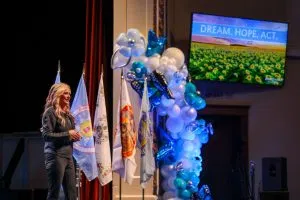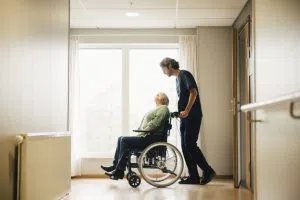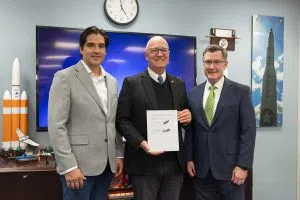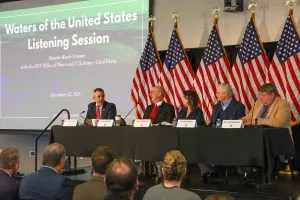
North Dakota first lady Kathryn Burgum speaks during the 2023 Recovery Reinvented event at Minot State University on Oct. 5, 2023. (Contributed/Office of the North Dakota Governor via the North Dakota Monitor)
(Michael Achterling/North Dakota Monitor) – First lady Kathryn Burgum has been the face of the Office of Recovery Reinvented, focused on ending the stigma around the disease of addiction. Now as Gov. Doug Burgum wraps up his final term, she is advocating for those efforts to continue.
On Wednesday, the Burgums will host their eighth annual Recovery Reinvented event. Kathryn Burgum said the event in Bismarck will likely be the last of its kind she and her husband host, but she plans to continue working to reduce the misconceptions surrounding addiction after Gov. Burgum leaves office.
“If one life could be saved and more people start talking about it, it’ll be worth it,” she said. “And it has been so worth it.”
Gov. Burgum established the Office of Recovery Reinvented through an executive order in 2018 to “promote strategic and innovative efforts to eliminate the shame and stigma associated with the disease of addiction.” Funding comes from private donations and a partnership with the Dakota Medical Foundation. The office is overseen by an advisory board with members appointed by Gov. Burgum and Kathryn Burgum serving as the chair.
In an interview with the North Dakota Monitor, Kathryn Burgum said she doesn’t know if North Dakota’s incoming governor will continue the initiative, but she is confident that substance abuse will continue to be addressed in some form in any new administration.
She added she has a meeting with Republican gubernatorial candidate Kelly Armstrong in the coming days and she plans to advocate for leaving the office in place if he is elected.
The first lady, who shares her personal story of being in long-term recovery, said she’s happy with the positive impacts the office has made. She cited the office’s statewide survey from 2021 that showed 75% of respondents consider addiction to be a disease, an increase of 12% from when the office first asked the question in 2018.
Jonathan Holth, managing director for the Office of Recovery Reinvented, said increasing that percentage is important because more resources can be made available.
“We know that people treat this differently when they believe it’s a disease,” Holth said. “Doing that opens up different doors. It opens up funding. It opens up how people view the treatment process.”
Holth said while the future of the office is uncertain, he is confident they have built a strong foundation in reducing the stigma associated with addiction that should make it easier for other groups to continue the office’s work.
Holth said he’s been in recovery for more than 16 years, but hadn’t gone public with his personal recovery journey until he was inspired by Burgum after she publicly admitted her struggles with addiction.

“I was thinking to myself, ‘If the first lady can talk about this, so can I,’” Holth said. “The stigma reduction work that we’ve done is really founded and grounded in giving people license, and giving people permission, to come forward and say, ‘I’m not OK and need help,’ and for communities to wrap their arms around those people without them feeling shame.”
Kurt Snyder, executive director for the Heartview Foundation, a recovery organization that offers inpatient and outpatient services, credited Recovery Reinvented with helping reduce that stigma. Snyder said when he started working with the foundation about 20 years ago, he would have to explain to groups about the misconceptions of recovery before he could address deeper addiction issues.
“I don’t have to do that anymore,” he said.
Snyder said the annual events have reached people who would have never been exposed to the impact of addiction in North Dakota. He also commended the couple for recognizing the accomplishments of recovery specialists in the state, which he said can go under the radar.

Burgum highlighted the work that peer support specialists do in the state. Because of the rural nature of North Dakota, she said peer support specialists are necessary to create a supportive person-to-person network as a path to recovery.
Burgum added many people in recovery have drug convictions on their records, which can make it difficult to find a job. Peer support specialists give those people a chance to continue talking about recovery and potentially helping others onto the same path.
Snyder said he admires the courage of the first lady for diving headfirst into a difficult issue and using it to better the state.
“She did that with grace. She did that with humility,” he said. “And you have the governor being her No. 1 fan. Amazing.”
Holth also said telling personal stories about addiction can be difficult, but it’s important to connect with others who are struggling because you never know when a breakthrough can happen with someone wanting to seek out treatment.
“It takes a strong person to share their story of addiction and recovery one time,” Holth said. “It takes one of the strongest people I’ve ever met in my life to do that over and over again for eight consecutive years, in every venue, and around the country, and in every corner of the state.
.









